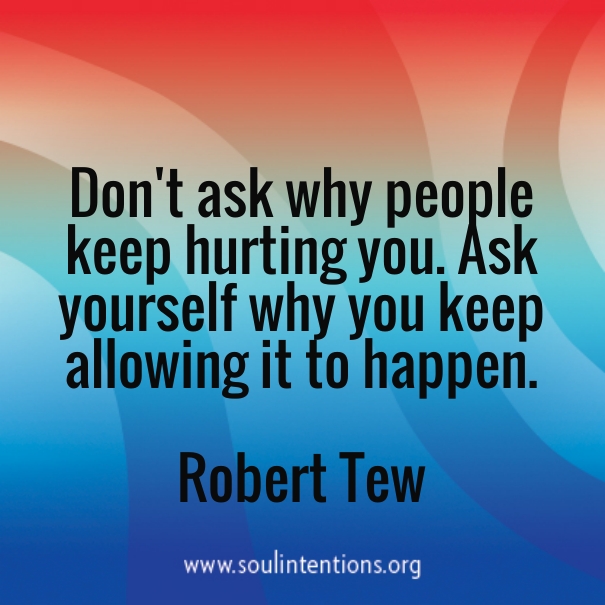
Here’s something that we all need to understand: Toxic relationships are a two-way street.
I can’t tell you how many times someone has asked me, “Why does this person treat me this way?” To which I reply (in the same compassionate yet firm way a very wise person answered me just a few years ago): “Because you are allowing them to treat you that way.”
In toxic or unhealthy relationships, we tend to see one of two scenarios:
- Person A mentally, emotionally or physically abuses Person B. Person B, whether out of fear or denial “accepts” it.
- Person A and Person B mentally, emotionally or physically abuse each other.
I was fortunate enough to be in both scenarios. I say fortunate because it was an eye-opening experience that taught me a great deal about myself. I learned, albeit very slowly, what I want and don’t want in a relationship, be it with a friend, family member, or boyfriend.
The information I reveal below is gleaned from data we collected from our Relationship Attachment Style Test in which we uncovered a new, toxic attachment style: Cross-Dependents. Here’s what our research reveals about them:
Identity: They share characteristics of dependent and co-dependent people. That’s why you’ll notice some contradictions in the top 10 list below; Cross-dependents are often needy, clingy, and indecisive, but they also have an acute need to control the relationship and their partner.
Background: They are likely to have severe emotional problems, sometimes a history of abuse (psychological, sexual or physical) either as a victim or perpetrator.
Character: Cross-dependents have:
- Very low self-esteem
- A high need to please
- A tendency to avoid getting too close to others
- An intense need for security
- A high need to control
- A tendency to comply with their partner’s requests
- A high level of indecisiveness
Behavior in relationships: Cross-dependents have a high need for security but at the same time, are more likely to want to avoid closeness. This “push and pull” pattern results in a love-hate, on-again-off-again relationship (“I love you, I need you, and can’t live without you – and I hate it.”) with frequent, vicious arguments. In relationships, Cross-dependents have both dependency and control issues. Essentially, they don’t want to rock the boat too much and risk a breakup, but they also don’t want to relinquish the control of the relationship either. Their form of control, however, can be manipulative, in order to keep their partner from leaving.
This is a toxic combination because it results in a vicious cycle: They will do whatever they can to please their partner, and when it’s not enough (or doesn’t have the effect they want), they get angry and resentment builds up, causing them to withdraw. At this point, their extremely fragile ego starts to frett about losing their partner; they start feeling guilty and try to make it up by tending to their partner’s every whim with even more diligence.
When it comes to the cross-dependents, it’s more likely that both partners will have this attachment style. They are the couples that tend to argue a lot, often “hitting below the belt,” and may be psychologically if not physically abusive – which exacerbates their low self-esteem issues. This often results in a very intense relationship where they know they are bad for each other and yet, can’t live without one another. What we have are two equally dysfunctional people who would not be able to have a relationship with anyone else, because as odd as it sounds, no one will understand them better than they understand each other. This combination is often seen in ill-fated Hollywood couples with extremely stormy relationships.
Here are the top 10 signs that you might be in an unhealthy, “cross-dependent” relationship:
1) You are not comfortable being yourself. You feel like you constantly need to put on an act that doesn’t reflect who you really are.
2) You are afraid to say anything that might upset your partner so you keep certain opinions and feelings to yourself.
3) You completely neglect your own needs in favor of your partner’s wants and desires.
4) You give in to your partner at the first sign of his or her disapproval.
5) You put aside your values if they are in conflict with your partner’s values.
6) Your partner refuses to allow you to see your friends.
7) You willingly do whatever your partner tells you, without question.
8) You want your partner to be completely dependent on you (remember, toxic relationships are a two-way street).
9) You tell your partner what to do, like what to wear or what to eat.
10) You choose to stay with your partner, even if he or she mistreats you.
If you take a moment to look up quotes on toxic relationships, what you’ll find is that a lot of them will encourage you to say “no” to people who take advantage of you, or to “burn bridges.” And rightfully so. But as the stats above reveal, there’s another side to the story. The bottom line is that the only person who is responsible for your happiness is you.
Insightfully yours,
Queen D

